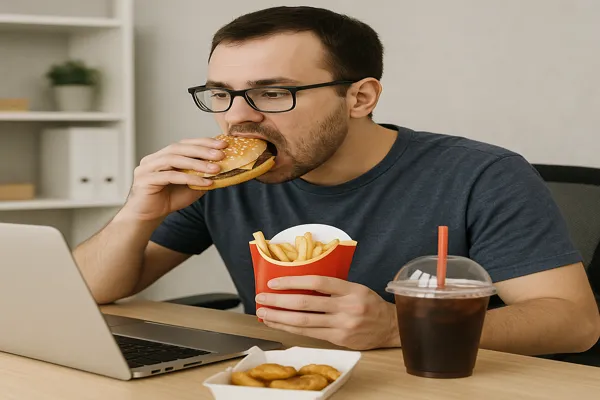
What If the British Food System Isn’t Broken But Doing Its Job?
The Food System Isn't Broken It's Just Brutal
I love food. I love cooking. I love feeding people.
So let me be clear: food in Britain is poor. Not in every home or every restaurant but across the board, we eat badly.
Ultra-processed foods (UPFs) fill our shelves. Health outcomes are sliding. And now, pressure is mounting: campaigns to ban UPFs, tax junk food, revamp school dinners. All based on one shared idea…
That the British food system is broken.
But what if it’s not?
What if it’s working exactly the way it was designed to?
The Real Purpose of Food in a Rich Economy
In a wealthy, industrialised nation like the UK, food doesn’t exist to delight or nourish. Not really.
Its primary role?
✅ Keep 65 million people alive
✅ Keep them functional enough to work
✅ Do it as cheaply and reliably as possible
That’s it. It’s not about flavour, culture, or nutrition. It’s about fuel - calories delivered fast, cheap and in bulk.
Why 'Bad' Food Works So Well
Poor-quality food keeps wages low. If workers can feed themselves on £5 a day, there’s no pressure on employers to pay more.
Fast, processed food also saves time - more hours for work, less time spent prepping or cooking.
It's also safe to eat in the very short term i.e food poisoning is far rarer now than decades ago which means less working days are being lost due to food.
But here’s the dark twist…
The side effects of bad food - illness, obesity, chronic disease - fuel other industries.
Heart disease? NHS and Big Pharma get busy.
Type 2 diabetes? Lifetime customer.
Frailty in old age? The care sector kicks in.
In short: cheap food supports productivity, and poor health supports the healthcare economy.
So as long as food keeps us able to work until we are in our late 60s it's done its job.
If we then develop chronic illness we'll become lifetime customers of the health sector.
And because Britain doesn't have a history of food no one is bemoaning the loss of British food heritage in fact if you asked most of the population they'll probably tell you food has got better in the last 30 years because we've now got so much choice.
No Conspiracy - Just Capitalism
This isn’t a shadowy plot. It’s basic economics.
Systems evolve to reward efficiency, scale, and profit. And ultra-processed foods tick every box:
Cheap to make
Easy to store
Quick to eat
Addictive enough to keep us coming back
So, if the goal is to keep workers fed, spending, and functioning (at least until retirement)… the system isn’t failing. It’s thriving.
But What Happens If We Eat Better?
Better food sounds like a win. But it comes with disruption.
More home-cooked meals mean:
More time off work
Higher food bills
More demand for real ingredients
Higher wages to afford it
Less time scrolling Big Tech
Less time to buy 'stuff'
Better food literacy means:
Less demand for UPFs
A shift in supply chains
Economic hits for food giants, health insurers, and care providers
So yes improving our diets improves people. But it destabilises the system.
Therefore why would a government minister pay more than lip service to it?
The role of MPs in a democracy is to get elected again in 5 years time.
They have to convince the electorate they care about them without ruining their lives.
Tackling the food system properly would be electoral suicide.
Broken, or Just Ruthless?
If you define success by efficiency and output, Britain’s food system works just fine.
Getting hold of food quickly, easy and cheap.
As I write this I'm hungry.
I could go to the nearest shop, buy and eat enough calories to see off that hunger and be back at my desk within 15 minutes.
The system works.
But if you care about human well-being, dignity, and long-term health it’s a different story.
We’ve built a system where food exists to keep us working, not thriving.
And once we stop being useful? Our poor health becomes part of the plan too.
That’s not a broken system. That’s a brutal one.
Why I Still Cook
Despite all this, I still love food.
I believe food should mean something. It should be a source of joy, not just fuel. A way to connect, not just a task to tick off.
But change won’t come from just banning a few additives or taxing a few products.
If we want better food, we have to rebuild the system behind it.
Let’s stop pretending it’s broken.
Let’s start asking who it’s working for and whether we’re okay with the answer.
If you’re as fascinated (or frustrated) by this system as I am, join the list.
I share new ideas, questions, and behind-the-scenes thinking a couple of times a month. No fluff. Just food, systems, and solutions.
Leave Your Email Below To Join The List